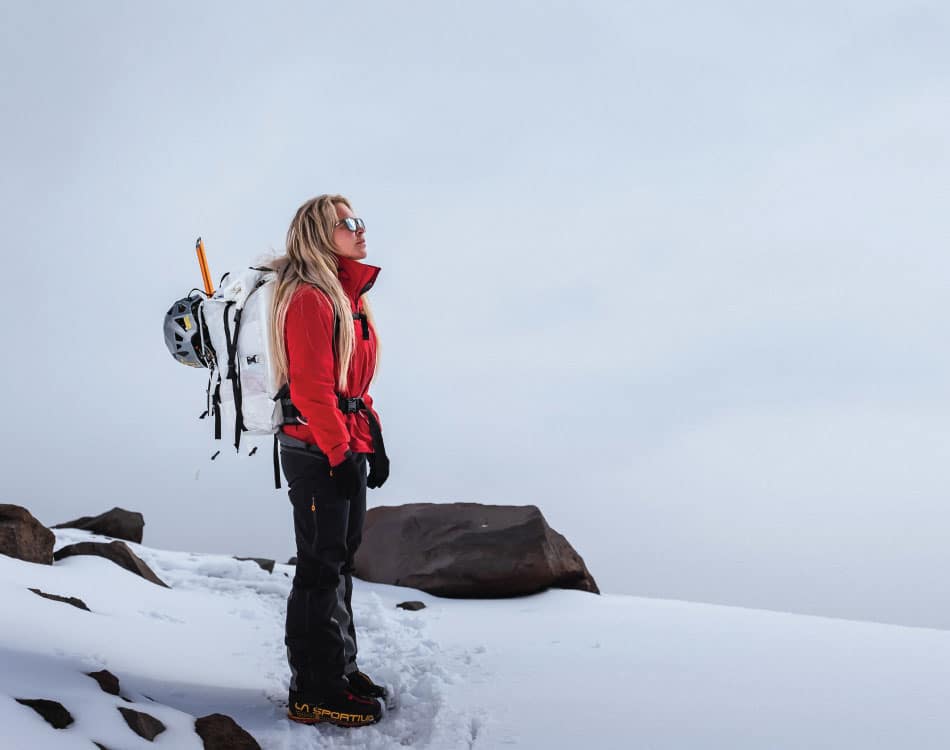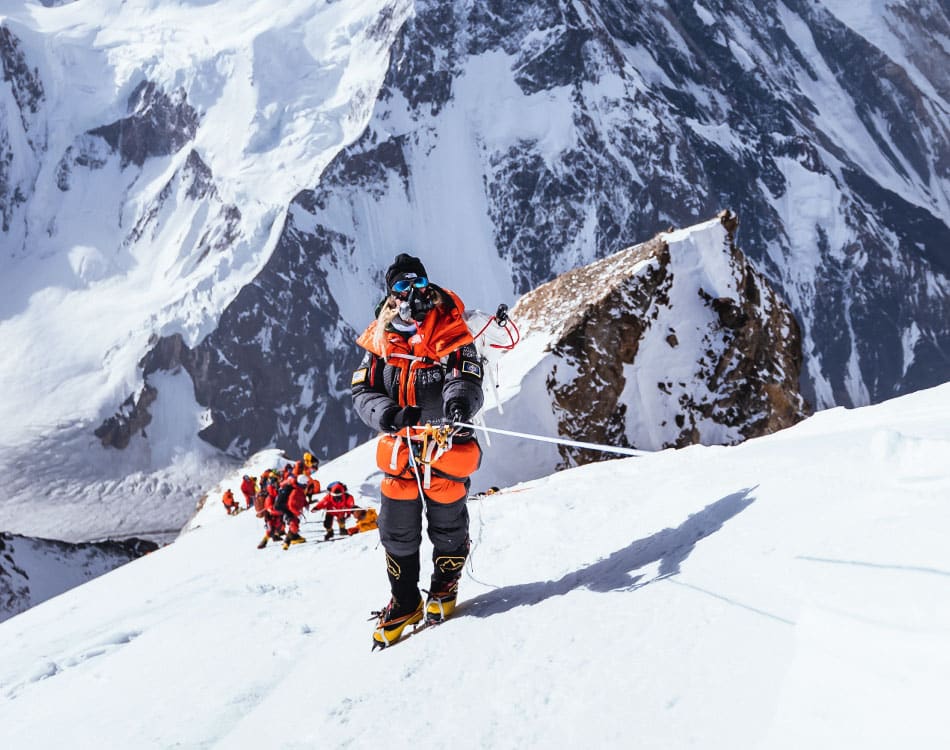Summiting the highest peak – literally and metaphorically – requires a level of mental and physical strength that many of us don’t believe we can achieve, but mother of seven (yes, you read that right!) Jenn Drummond is proof that anything is possible with the right motivation and approach.
After surviving a life-threatening car accident in 2018 involving her SUV and a semi-truck, Jenn was left awestruck and emboldened as rescue workers were amazed that she came out of it alive.
That’s when she realised you don’t get to choose when you leave this life but you can choose how you live it. Emboldened by this awareness, she set out to live in a more authentic and adventurous way.
Inspired to climb a mountain for her 40th birthday in 2020, her son raised the stakes by suggesting Mount Everest. Not one to back down from a challenge, she accepted the pursuit.
During her training, her coach upped the ante and proposed that she go for a Guinness World Record and become the first woman to climb the 7 Second Summits – the seven second-highest peaks on each continent, which many consider a more difficult challenge than the Seven Summits, which includes the highest peaks on each continent, including Everest and Denali.
Today, Jenn is a world record holder who elevates others to master their own summit in life. She’s a successful business owner and an international speaker, author, and the host of the Seek Your Next Summit podcast. She is focused on inspiring others to go beyond success to a life of significance.
The 7 Second Summits include:
- Mount Logan, Canada (North America)
- Ojos del Salado, Chile (South America)
- Mount Kenya, Kenya (Africa)
- Gora Dykh-Tau, Russia (Europe)
- Mount Tyree, Antarctic
- K2, Pakistan-China border (Asia)
- Mount Townsend, Australia

Reaching your peak
Choosing to take charge of your physical and mental health and lifestyle is a worthy pursuit for anyone, but for many, taking the first step to a new life is the scariest and most difficult.
“For many, the first step toward change is daunting because it represents stepping into the unknown, leaving behind the comfort of the familiar,” says Jenn.
“My accident was a defining moment, a clarion call that forced me to reassess everything in my life. However, not everyone experiences such a dramatic tipping point.”
The good news is that you don’t need a life-altering event to ignite change.
“Motivation doesn’t always come as a flash of inspiration; sometimes, it’s a quiet nudge or a persistent feeling that something more is possible.”
To find that motivation, Jenn says you can start by connecting with your “why” – your reason to make a change. “It is the foundation that keeps you grounded when the journey gets tough.”
Another powerful approach is to take small, manageable steps, continues Jenn. “The first step doesn’t have to be a giant leap. It’s often the small, consistent actions that lead to lasting change. Break down your goals into bite-sized pieces and celebrate each small victory. This approach not only builds confidence but also creates momentum.”
Lastly, Jenn says you shouldn’t be afraid to embrace discomfort. “Change is often uncomfortable because it challenges us to grow beyond our limits, but it’s in that discomfort that we find our true resilience and strength. Remember, it’s not about achieving perfection; it’s about making progress and showing up for yourself day after day.”
Building mental strength
Beyond the physical strength Jenn developed to achieve her monumental feats, it is mental resilience and fortitude that defines her success.
“Building and maintaining mental resilience has been at the core of every mountain I’ve climbed, both literal and metaphorical. The physical challenges are significant, but the mental fortitude determines whether you succeed or fall short,” explains Jenn.
Whether she is facing a difficult climb or a personal challenge, breaking it down into manageable steps has been essential to her success.
“I often remind myself to take the ‘safe step’, focusing on the next best move rather than getting lost in the enormity of the journey. This approach helps me stay grounded and reduces anxiety, allowing me to push through even when things get tough.”
Another critical lesson she shares is the importance of reframing negative experiences, as our minds tend to dwell on failures or fears.
“I’ve learned to be the DJ of my memories, diluting the negative and amplifying the positive. By consciously focusing on what I’ve learned, rather than what I’ve lost, I’ve maintained a positive outlook and built a resilient mindset.”
In this regard, Jenn says maintaining your mental muscle is much like physical training – it requires consistent practice.
“Daily habits like meditation, journaling, and visualisation help me stay mentally sharp and connected to my deeper purpose. These practices reinforce my resilience and ensure that I’m not just reacting to life but proactively shaping it.”
According to Jenn, building a Breakproof mindset is similar to physical strength and requires intentional practice and dedication. Here are a few strategies that have helped her:
- Growth happens outside your comfort zone. Build confidence and adaptability by deliberately facing challenging situations.
- Prioritise the journey over the destination. Staying present and engaged in the process helps you navigate setbacks with resilience and keeps you grounded in the moment.
- Connect with your why anchors you to your purpose when challenges arise. Your “why” becomes your motivation to persevere through adversity and stay committed.
- Resilience isn’t about being invincible, it’s about bouncing back. Treat yourself with kindness, learn from setbacks, and move forward.
- Conquering big mountains takes big teams. It is so important to surround ourselves with people who believe in and encourage you. A strong support network provides perspective and helps you stay resilient during tough times.
The physical foundation
However, a resilient mind must reside in a strong body. For this reason, Jenn also works to foster her physical strength and optimal biomechanical function.
“When your body is strong and functioning efficiently, it enhances mental clarity by improving blood flow to the brain. This increased cognitive function allows you to handle stress better, make decisions under pressure, and maintain focus during challenging situations,” she explains.
“Moreover, physical strength builds confidence. Knowing that your body can handle physical challenges gives you a sense of capability that extends into other areas of life. This confidence is vital to mental resilience, empowering you to face and overcome obstacles with a stronger mindset.”

Mountain mobility
Like mental strength, mobility is a crucial yet often overlooked aspect of holistic health and fitness. To ensure it fits into her busy lifestyle, Jenn treats mobility work equally as any other part of her training.
“Instead of viewing it as optional, I integrate it into my daily routine, particularly during warm-ups and cool-downs, ensuring I consistently address flexibility and joint health.”
She also pairs mobility exercises with mindfulness practices, using the time to breathe deeply and clear my mind.
“This approach helps me enhance both physical and mental resilience. On busy days, I incorporate mobility into daily tasks—stretching during calls or using a foam roller during breaks—ensuring it remains a priority.”
By making mobility a non-negotiable part of her routine, she maintains the physical and mental agility needed to crest any summit in life.
Dynamic mobility drills are excellent for to prepare your body for a hike up a mountain, before a workout, or on a rest day for some active recovery as they:
- Mobilise connective tissues and muscles, making them more elastic.
- Circulates synovial fluid to improve joint function.
- Improves neural control of movements.
These benefits help increase range of motion (ROM) and neural activation, thus improving movement quality for subsequent exercises or activities.

















